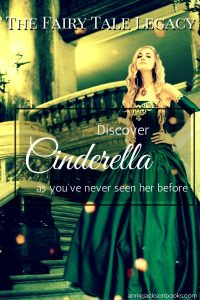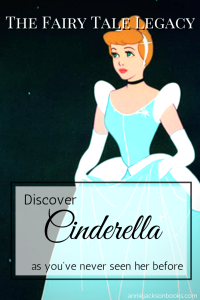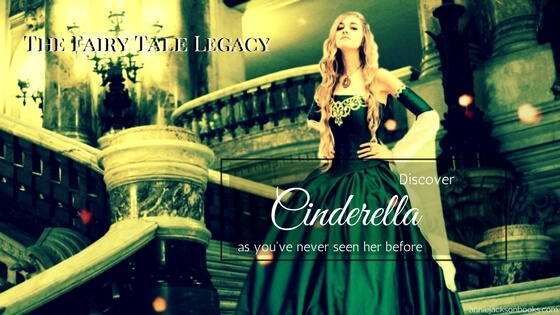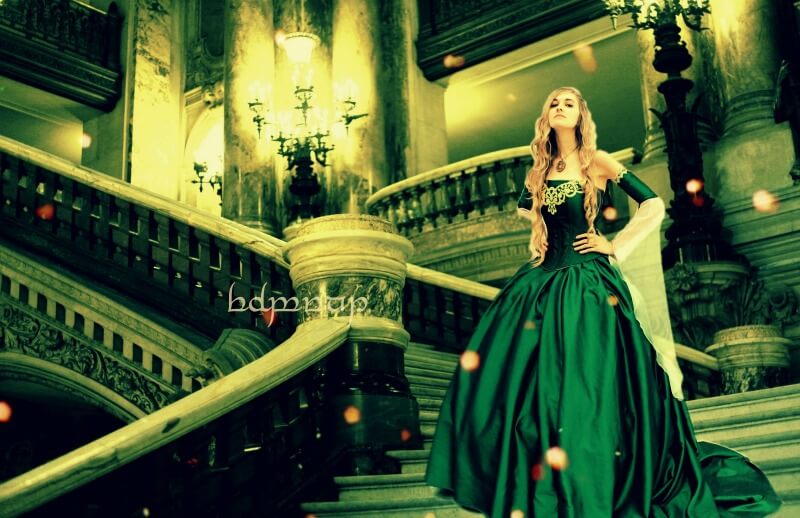We have this false idea that fairy tales are about weak and passive heroines, damsels in distress. So we are always fighting against a fairy tale legacy that doesn’t exist.
Cinderella may be one of the most retold of the fairy tales in our society. And so rather by default, most often falls victim to the fairy tale legacy. This poor girl trapped in a life of cruelty and hardship until a prince pulls her out of it by making her his wife.
And while that is essentially the facts of the plot, I contest the “poor girl trapped” part. Disney’s film is a relatively faithful retelling of the Charles Perrault story featured in Andrew Lang’s Blue Fairy Book. The goodness and sweetness is there in the original story, though it loses some of its power in the film.
Like a lot of fairy tale heroines though, Cinderella’s goodness “saves” her more than any prince. After all, her kindness and friendship is the reason the mice rescued her from the locked room. In the Perrault version she is so good you can’t really believe her life would have turned out any other way than happily because of who she is. In the Disney’s Cinderella, she is softer and almost saccharine sweet (it was really never my favorite of their films).
You miss the power of her kindness because they left out the part where she’s gracious to her step-sisters at the balls even after they’re horrible to her. But our culture equates that sort of gentle spirit with weakness when it is so far from it. It’s easy to think that Disney reduced her to nothing more than soft and sweet – qualities we don’t equate with strength or power.
But even in the Disney film, there can be so much more to her.
If Cinderella is a damsel in distress its because her step-mother makes her work hard, and denies her any sort of luxuries (like a soft bed). One could argue that hard work is a good thing that makes her stronger.
It’s interesting, though, that in the Charles Perrault version, it’s the step-sisters who are cruel to her and vicious with their words. The Grimm brothers (who I think earned their name with the tone of their fairy tales) took it to a much darker place with toes and heels being cut off. Perrault was my kind of fairy taleist. Her father doesn’t actually die. He’s just not a part of the story because Cinderella doesn’t tell him about the hardship she’s enduring.
But it’s understandable why most versions have the father pass away at the beginning. I think the father has to be removed from her story because if he were there and he knew – he’d put a stop to it and protect her. In Perrault’s story, he’s the most passive character in the narrative, not the heroine we so often deride.
The key to Cinderella, that both makes her strong and interesting and powerful is that despite the hardship of her step-mother and the cruelty of her step-sisters and the passive ignorance of her father (or grief from his loss in other versions) she is still good and kind. She doesn’t let any of that make her vicious or resentful or cruel.
We underestimate that so easily when Disney has made her almost sickeningly sweet. But there’s incredible power in not letting awful circumstances turn you into an awful person.
Cinderella endures loss; endures pain and is still beautiful enough in her heart for the prince to be captivated by her. And one could also argue it’s the fairy godmother who saves her more than the prince. He chooses her, because he loves her. Because her character is as radiant as her dress and her slippers. But he only had the chance because of the choices she made and the gifts of her fairy godmother.
Because she is strong willed. She defies her step-mother to make her own choices and take a chance on the life she wants.
Which is how you know, whether she fell in love with a prince or a pauper or no one at all, she would not have been trapped in that life of toil and an immense lack of love. She found love. She fought for it. She chose the life she wanted and others came around her to help because no one does it entirely on their own. She took a risk when the opportunity was granted to her and she did it all with the kindness and grace of a princess.


THE FAIRY TALE LEGACIES
Sleeping Beauty | Cinderella | Beauty and the Beast | The Little Mermaid | Snow White and Rose Red | Rapunzel | Jasmine | Twelve Dancing Princesses | Snow White | The Snow Queen | Overview
Want to refresh your memory of the fairy tale? SurLaLune fairy tales has an annotated Charles Perrault version. And Angie has a great comparison of the fairy tale and Disney movie as part of her Project Disney.


I love this post! So true on so many points. It’s too unfortunate that Cinderella’s virtues are portrayed as weakness. Industry (even when forced, that makes it better not worse!), kindness, endurance, choosing not to stoop etc etc, what does that say about us as media consumers?
I hope some of the “sickeningly sweet” aspects are toned down in the upcoming live action movie. Maybe it’s exactly the same but with people and trained birds and mice (what WILL they do about that?? I know, CGI- but isn’t my idea more fun?) Or, maybe it will fall victim to the modern tendency to “anti legacy” (we’re going to need a better name for this, don’t you think). But I have hopes and they are high.
I think it’s a detriment of our society that they virtues are not only portrayed as weakness, but perceived that way also. I just wasn’t able to express that very well in this post. It says a lot about us as a culture.
They cast a very soft spoken, sweet girl (from Downton Abbey) I think so she alludes to the animated character but I don’t think she’ll be as saccharine. I think they will try to “anti-legacy” it a bit but Disney has gotten more subtle in how they do that. And you’re right, we definitely need a better name for that 🙂
The Disney version really strips that strong will from her, IMO. Instead of her triumph being a result of her hard working and determined spirit and how she used those traits to stay strong and achieve her dreams, her sweet and enduring spirit saved her through a third party, the fairy godmother. While it’s fun to see the magic and hear the song (I don’t hate the movie. It’s just not one of my favorites.), Cinderella really doesn’t do anything at all to save herself. The animals make her dress, free her from the room, etc. She’s just … present and pretty and nice. In terms of Disney heroines, she’s one of the most vanilla ones.
All of that to say, a lot of Disney-fied fairy tales took the impetus away from the heroine. Your fairy godmother will save you. Prince Phillip will hack through the forest and the dragon and save you. The dwarves and that stranger prince will save you. Go fall asleep or cry over there in that corner while the people with the real power do the work. It not only created this idea that we should wait around for a perfect ending to solve our problems, but it doesn’t reward those qualities of determination and bravery, because the titular character isn’t the one most embodying them. More recently, Disney has been adjusting this. Brave, Tangled and Frozen all feature girls who don’t sit around and wait for a prince to save them. They solve their own problems (though a man might be along for the ride).
It’s so interesting, I’ve been learning so much as I write these posts. You’re right, the Disney movie strips a lot of the power and Cinderella’s self will from the story.
What I’ve discovered is that there’s really an evolution to the Disney films. Snow White, Cinderella and Sleeping Beauty were very much a product of their time (1938, 1950 and 1959 respectively). But then you get into Ariel, Belle and even Nala in the Lion King and they’re all independent, interesting characters. I’m really looking forward to examining some of the other heroines more closely throughout the year to see the differences in our perceptions of the fairy tales and what impact Disney had on our cultural perception of them.
This was another wonderful post to read! It’s so interesting to think that Cinderella’s kindness was a strength and how powerful it is that even through all her hardships she remained a good person. It’s sad that kindness is seen as a weakness, when it’s so needed nowadays and can do so much to improve our society.
thank you 🙂 I agree kindness can be so effective and so powerful – Martin Luther King Jr. knew that. Ghandi knew that. But we forget it so easily because it doesn’t *feel* as powerful or strong. I think that’s why we need stories that display characters who are kind but also strong – to remind our culture of those things 🙂
Lovely post! I think we all *know* that the Disney version is different from past versions, but we don’t really stop to think about how and what effects it has had on how Cinderella (and other fairy tales) are perceived!
I did know about the gore in the Grimm brothers version, but I think the kindness of the original Charles Perrault version really does get lost in the Disney adaptation. We know that the stepmother helps Cinderella because of her pure heart, but the little kindnesses you mentioned (like her being gracious to her stepsisters at the ball) really do get lost in the adaptation.
Because of this, it really is all to easy to call Cinderella a damsel in distress saved by her prince. But the things you mentioned — like her hard work, kindness in the face of adversity and cruelty, etc. are what really got her her fairy godmother and a trip to the palace. These are the kind of values that we really seem to de-emphasize today, thinking that they don’t get us anywhere — but they can if we only try our best.
This post really made me think so much and re-evaluate what I thought I already knew, thank you!
Thank you! That’s such a great comment 🙂
I kind of always had a Disney idea of Cinderella, just super sweet. So, I was surprised too when I read the Perrault version and she was sweet and kind but it was a powerful thing rather than something that made her soft. It reminded me what I love about fairy tales because they are interesting and sometimes powerful stories.
Oh, I also forgot to mention — what do you think about the new live-action Cinderella film made by Disney coming out this year? The first time I saw the trailer I was really disappointed that there didn’t seem to be any twists or differences. But seeing it again after reading this post, I realized how much this new film is going to re-emphasize the values of the original, so now I’m excited! Pus, I think the kindness and goodness values really will shine through — watching the trailer gave me goosebumps!
I’m excited to the see the new movie too! I think in a lot of ways they tried to sort of just do a live action version of the original movie – I was a little disappointed by that too. But I hope that’s sort of what they’re showing us in the trailer but when we get to the film there will be some surprises and more of the values of the original. And hopefully some twists 🙂
I must admit I never thought about Cinderella that way. I admire how she remained so sweet and caring, but it never came across to me that it’s a certain strength to stay that way. While it’s not my favorite Disney movie, I think they captured her kindness in a good way – but they don’t place enough focus on the fact that she is strong in her own way.
I think it’s something we take for granted. We admire people who are kind or generous in difficult situations but we don’t think about what it takes to remain that way. I curious to see what new dimensions Disney brings to her with the live action movie 🙂
I’ve always known the “Grimm” story, that’s the one I read as a child and loved, so it was always strange to see some parts cut from the Hollywood animations and movies. But I can’t wait to see the new movie, as for retellings, ‘Cinder’ was the one I loved the most 😀
Hollywood definitely usually offers a softer version than the Grimm Brothers 🙂 I think it’s funny how we try to soften the “grimm” parts of fairy tales for kids when they really don’t need it. I like the way Cinder combines fairy tale and sci-fi elements. I think Enchanted by Alethea Kontis is my favorite Cinderella retelling, though it’s more of a mash up than a straight retelling 🙂
As a librarian, I read “Cinderella stories ” to 6th graders. When I read the Grimm”s version, they clapped at the end of the story. The earliest version of a Cinderella story was written in China about 850 AD and is called Yeh-Shen. It is interesting to read and collect Cinderella stories.
I love that kids don’t really flinch at how gruesome Grimm can be. That the darkness makes the ending all the more satisfying. I did not know about Yeh-Shen, but I agree, looking at the different versions of these stores is incredibly fascinating.
I think the only real thing that the prince saves Cinderella from is the impoverished conditions that her family has placed her in. I mean, she had love from the mice and her fairy godmother, so she wasn’t lacking for love. And she definitely wasn’t lacking for character – as you mentioned, she has the strength of will to remain kind, even to those who have been so cruel to her. So I think it’s a misconception that she’s a weak damsel in distress who needs the prince to save her. She became the person that the prince fell in love with all on her own, and was assisted by those who could see her kindness in attending the ball, and thus catching the eye of the prince. I think, perhaps, Cinderella is underestimated.
Lovely post! 😀
It’s funny that people think of the prince as a rescuer in stories like “Cinderella” (and “Snow White” and “Sleeping Beauty”) when they barely have any presence in the story. I see the prince as more of a reward for all of Cinderella’s suffering.
oh my gosh – I love that perspective! And it is so odd that we have culturally given the prince’s credit for rescuing these girls when they actually do so little in the fairy tale. They have no agency or very little, which is what we accuse the girls of, even though the girls predominately drive the story. The prince as her reward rather than her rescuer is my favorite thing I’ve heard all day 🙂